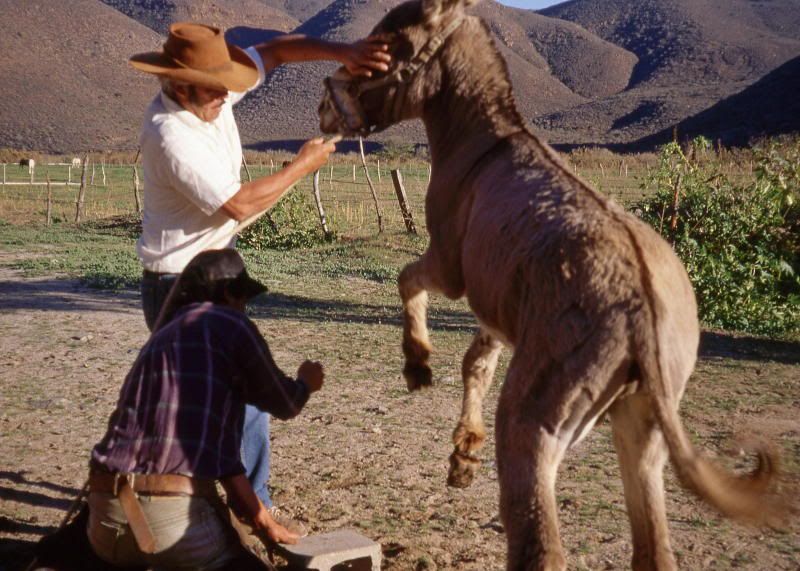Originally posted by Mulegena
What an exquisitely exciting poem, Graham. Thank you.
In my sparse American education I've never read the author before now.
The lowly beast of burden depicted first as a mythical monster yet one with a secret gift to fulfill. Love it. In four short stanzas, Chesterton
conveys a strong reminder about self-worth and the need to break free of society’s view of us.
The first stanza describes the night the donkey was born. The mood is frightening and magical. "As fish are flying, trees are walking and the moon is
red in color,..." Its a strange night when the natural order and the balance of things are off-kilter big time. Yet we find that moments like this are
necessary in the grand scheme of life.
And the second to describe what he looked like. With a “monstrous head” and “ears like errant wings” its clear that he wasn’t a beautiful baby animal.
He admits to have uttered a “sickening cry” as he was born.
He is “The tattered outlaw of the earth, Of ancient crooked will”. This is my favorite phrase of the whole poem-- its great and really feels like Baja
to me. He talks about his character, that people “Starve, scourge, deride me” as he is “dumb” and thus unworthy of care or respect... or is he just
plain-axx stubborn (not like me, of course).
In the fourth line he states, “I keep my secret still.” What is this secret? What secret lies in each of our hearts that makes us special, makes our
lives have meaning, defines what we bring to the world?
We see in the final stanza that this donkey is no ordinary donkey. The poet finally comes 'round to telling us just who this donkey really is (read:
who we really are). It becomes clear that this monstrous beast carried Jesus through Jerusalem on Palm Sunday, “There was a shout about my ears, And
palms before my feet.” Its supposed that hours before his entrance into the city Jesus asked two of his disciples to fetch a donkey from a neighboring
village that had never been ridden or wanted. He knew that only an outcast like himself could properly handle the job and be deserving of such an
honor.
Aside from the historical and religious context, this is a poem about self-worth. Like the donkey, we all have been abused and made to suffer
unkindness, and yet we have our moments in life where we know why we are where we are and what our purpose is, our Secret that makes life worthwhile.
I think we might all feel that connection to the underlying pulse of life when we're walking closer to the earth. The Donkey is the perfect symbol of
the indomitable spirit, this common thread that we share in our love of Baja.
|


 I wish Mike the best on his awesome adventure. Some of you have wondered about
snakes. I was not too far from where Mike is now in Nov. and I spent 3 weeks doing tons of hiking daily and saw no snakes. In April I was in the same
area and saw 8 snakes. So, time of year thing? In April there were several GIANT swarms of bees but none in Nov. Snakes I don't care for but those
bees freaked me out. Hopefully Mike, Don Kay and Solo avoid both these things. I tried to attach a pic of a rattlesnake I took but even compressed
it's way too big
I wish Mike the best on his awesome adventure. Some of you have wondered about
snakes. I was not too far from where Mike is now in Nov. and I spent 3 weeks doing tons of hiking daily and saw no snakes. In April I was in the same
area and saw 8 snakes. So, time of year thing? In April there were several GIANT swarms of bees but none in Nov. Snakes I don't care for but those
bees freaked me out. Hopefully Mike, Don Kay and Solo avoid both these things. I tried to attach a pic of a rattlesnake I took but even compressed
it's way too big




















 He's got a
hot date somewhere.
He's got a
hot date somewhere.



















 Good for you Shari! A Canadian kidnapping plan... or is that BURROnapping?
Good for you Shari! A Canadian kidnapping plan... or is that BURROnapping?


























 for
making the chicken salad tostadas for the competitors.
for
making the chicken salad tostadas for the competitors.





